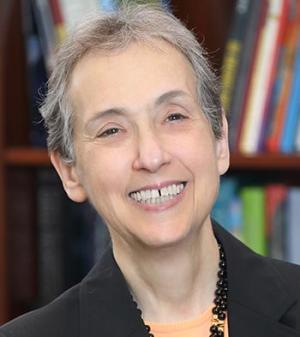From the Deputy Director for Intramural Research
Great Mentors and Mentees Are Made, Not Born

Nina F. Schor
I was once asked by a student how old one has to be to no longer need mentors. I answered, “If there is such an age, I have not yet reached it.” My answer was both heartfelt truth and glib retort. I don’t know how the student took it, but this brief encounter got me thinking about the concept and practical reality of having and being a mentor.
Mentor, of course, is a given name from Greek mythology: Mentor was appointed by Odysseus to look after and guide Odysseus’s son, Telemachus, while Odysseus fought in the Trojan War. This was an explicit assignment born of a relationship between Odysseus and Mentor of trust and alignment of values. But as I think of those I consider my mentors over the years, I doubt many of them would use that term to describe what they did for me.
Before I went to college, my mentors included my parents and schoolteachers. I think even now of standout teachers who nurtured my curiosity and creativity, gave me confidence in my judgement, and weren’t afraid to tell me when I needed to go back to the drawing board. In college, those I thought of as mentors asked me the really hard questions that challenged me and supported and encouraged me to persist when I was “close but no cigar.”
In graduate school (The Rockefeller University in New York), Dr. Anthony Cerami was my thesis mentor, but many others also guided various aspects of my work and career aspirations. In medical school (Weill Cornell Medical College in New York), a handful of professors welcomed me to their “club” long before I was worthy of that honor and ensured that I was invited to see the right patients, attend the right conferences, and meet the right faculty members to acquire the skills and knowledge I would need going forward. Finally, as a resident and faculty member in three different academic institutions, I depended on a few experienced colleagues and guides to get me through challenges and career-growth experiences.
Perhaps Dr. Cerami thinks of himself as my mentor, as our relationship was an explicit and formal one documented on the title page of my thesis! But I doubt that any of the others, many of whom I have remained in touch with long after I left their institutions, would think of themselves as such.
Today’s trainees tend to think of a mentor as someone with whom one has a formal agreement and arrangement, someone explicitly designated or chosen as a mentor. To some extent, this is a good thing. It implies reciprocal obligation and responsibility and increases the likelihood of regular, structured dialogue. But I would hate to think that anyone feels restricted to mentors with whom they have a formal connection. Over the course of one’s career, the number, identities, and roles of mentors and the nature of the relationship between the mentors and the “mentee” should evolve and change.
No one is born knowing how to be a mentor or how to be a mentee. It takes role models (both positive and negative), experience and practice, critique from others who have mentored or been mentored previously, and a mutual commitment between mentor and mentee to work at it and to make it work.
Several situations and behaviors can ruin any mentor-mentee relationship. For example, competition between the mentor and the mentee is a dangerous condition. The mentor and mentee must be playing on the same team and the team’s aim must be the success of the mentee and the consequent success of the scientific pursuit of knowledge. Also, ridicule, embarrassment, or public rebuke never motivated anyone to do better or work for their team. (Dirty laundry belongs in the laundry room with the door closed, not out in the open for others to see.) A mentor should always be thinking about how to motivate mentees to do better and to strive for excellence. That frame of mind also means it’s neither helpful nor wise to tolerate less than the best effort or letting mediocre science slide by in the interest of avoiding teaching a tough lesson.
Mentees need to be proactive, too, including being both respectful and open with a mentor. Mentees are responsible for a large measure of the direction of their learning, experience, project, career direction, and science. Mentees should come to a formal meeting with their mentor prepared with an agenda, a progress report, and a list of questions and discussion items. This is a dialogue; neither person can do it alone.
NIH has long been one of the very best places on the planet at which to be a scientist. And many of us are here to help you: your mentors; your team; the Training Directors at your Institutes or Centers (ICs); Dr. Sharon Milgram’s team in the Office of Intramural Training and Education; your IC’s Scientific and Clinical Directors; and me, the Deputy Director for Intramural Research. Engage with us, call upon us, inform us proactively and before a major challenge or a crisis arises. Anticipate and seek guidance. We all are a resource to you and to each other. Here, as between mentors and mentees, dialogue, respect, and openness are everything!
This page was last updated on Friday, March 17, 2023
